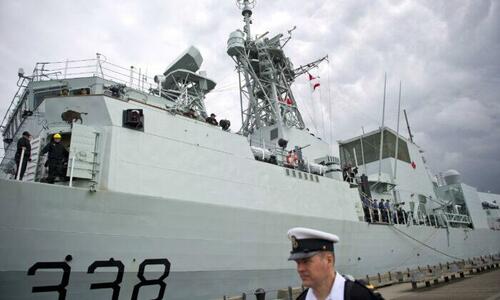
Authored by Peter Wilson via The Epoch Times,
Foreign Affairs Minister Mélanie Joly says Canada is planning to increase its number of warships in the Taiwan Strait as a message to China that the waters are not its national property.
“We will continue to enforce the international rules-based order when it comes to the Taiwan Strait. And that’s why also we had a frigate going through the Taiwan Strait this summer, along with the Americans, [and] we’re looking to have more frigates going through it,” Joly told the Financial Times.
“We need to make sure that the question of the Taiwan Strait is clear and that it remains an international strait.”
The Taiwan Strait is a stretch of international waters less than 200 kilometres wide separating Taiwan from mainland China. Chinese Foreign Ministry spokesman Wang Wenbin had said at a regular news briefing in Beijing on June 13: “There is no such thing as international waters in international maritime law. … Relevant countries claim that the Taiwan Strait is in international waters with the aim to manipulate the Taiwan question and threaten China’s sovereignty.”
Foreign Affairs Minister Joly’s comments come less than two weeks after she unveiled Canada’s new Indo-Pacific Strategy, during the announcement of which the Foreign Affairs Minister referred to China as an “increasingly disruptive” global power.
The new strategy also includes a pledge by the federal government to spend $2.2. billion on investments in the region over the next five years.
Joly said Canada will be “committing to new military assets” in the Indo-Pacific, and later told reporters in Bucharest, Romania, where she is attending a NATO foreign affairs ministers’ meeting, that Canada must “play a role in the security” of the Indo-Pacific.
“We need to invest in deterrence because we believe … it is the best way to, at the end of the day, respect international norms,” she said.
More Military
Before Joly announced the strategy, Prime Minister Justin Trudeau said the Canadian Armed Forces will also be increasing its presence in the Indo-Pacific region, with additional investments by the federal government to support them.
“We’ll be making new investments to enhance the Canadian Armed Forces engagement in the region,” Trudeau told reporters in Bangkok, Thailand, on Nov. 18. “This will support our allies, Japan and South Korea, and all of us in the Pacific.”
Canada’s Indo-Pacific Strategy also says China continues to disregard “international norms” as a means toward becoming the region’s “leading power.”
“China’s assertive pursuit of its economic and security interests, advancement of unilateral claims, foreign interference and increasingly coercive treatment of other countries and economies have significant implications in the region, in Canada and around the world,” the strategy reads.
Joly previously said Canada will “challenge China when we ought to, and we will cooperate with China when we must” when speaking to reporters in Toronto, on Nov. 9.
“Its sheer size and influence makes cooperation necessary to address the world’s existential pressures,” she said.
However, while recently speaking to reporters in Bucharest, Joly also reacted to a report from the Pentagon released several days ago saying China is on pace to almost quadruple its number of nuclear warheads by 2035.
Joly said Canada is “taking note definitely” of China’s increasing nuclear capacity and said Canada will “make sure we have better intelligence capacity across the region” in the near future.
“We are a Pacific nation, we need to make sure that we play a bigger role,” she said, according to the Financial Post.
“Since this part of the world is so important for us, we need to be a reliable partner because for too long we weren’t.”
Authored by Peter Wilson via The Epoch Times,
Foreign Affairs Minister Mélanie Joly says Canada is planning to increase its number of warships in the Taiwan Strait as a message to China that the waters are not its national property.
“We will continue to enforce the international rules-based order when it comes to the Taiwan Strait. And that’s why also we had a frigate going through the Taiwan Strait this summer, along with the Americans, [and] we’re looking to have more frigates going through it,” Joly told the Financial Times.
“We need to make sure that the question of the Taiwan Strait is clear and that it remains an international strait.”
The Taiwan Strait is a stretch of international waters less than 200 kilometres wide separating Taiwan from mainland China. Chinese Foreign Ministry spokesman Wang Wenbin had said at a regular news briefing in Beijing on June 13: “There is no such thing as international waters in international maritime law. … Relevant countries claim that the Taiwan Strait is in international waters with the aim to manipulate the Taiwan question and threaten China’s sovereignty.”
Foreign Affairs Minister Joly’s comments come less than two weeks after she unveiled Canada’s new Indo-Pacific Strategy, during the announcement of which the Foreign Affairs Minister referred to China as an “increasingly disruptive” global power.
The new strategy also includes a pledge by the federal government to spend $2.2. billion on investments in the region over the next five years.
Joly said Canada will be “committing to new military assets” in the Indo-Pacific, and later told reporters in Bucharest, Romania, where she is attending a NATO foreign affairs ministers’ meeting, that Canada must “play a role in the security” of the Indo-Pacific.
“We need to invest in deterrence because we believe … it is the best way to, at the end of the day, respect international norms,” she said.
More Military
Before Joly announced the strategy, Prime Minister Justin Trudeau said the Canadian Armed Forces will also be increasing its presence in the Indo-Pacific region, with additional investments by the federal government to support them.
“We’ll be making new investments to enhance the Canadian Armed Forces engagement in the region,” Trudeau told reporters in Bangkok, Thailand, on Nov. 18. “This will support our allies, Japan and South Korea, and all of us in the Pacific.”
Canada’s Indo-Pacific Strategy also says China continues to disregard “international norms” as a means toward becoming the region’s “leading power.”
“China’s assertive pursuit of its economic and security interests, advancement of unilateral claims, foreign interference and increasingly coercive treatment of other countries and economies have significant implications in the region, in Canada and around the world,” the strategy reads.
Joly previously said Canada will “challenge China when we ought to, and we will cooperate with China when we must” when speaking to reporters in Toronto, on Nov. 9.
“Its sheer size and influence makes cooperation necessary to address the world’s existential pressures,” she said.
However, while recently speaking to reporters in Bucharest, Joly also reacted to a report from the Pentagon released several days ago saying China is on pace to almost quadruple its number of nuclear warheads by 2035.
Joly said Canada is “taking note definitely” of China’s increasing nuclear capacity and said Canada will “make sure we have better intelligence capacity across the region” in the near future.
“We are a Pacific nation, we need to make sure that we play a bigger role,” she said, according to the Financial Post.
“Since this part of the world is so important for us, we need to be a reliable partner because for too long we weren’t.”






